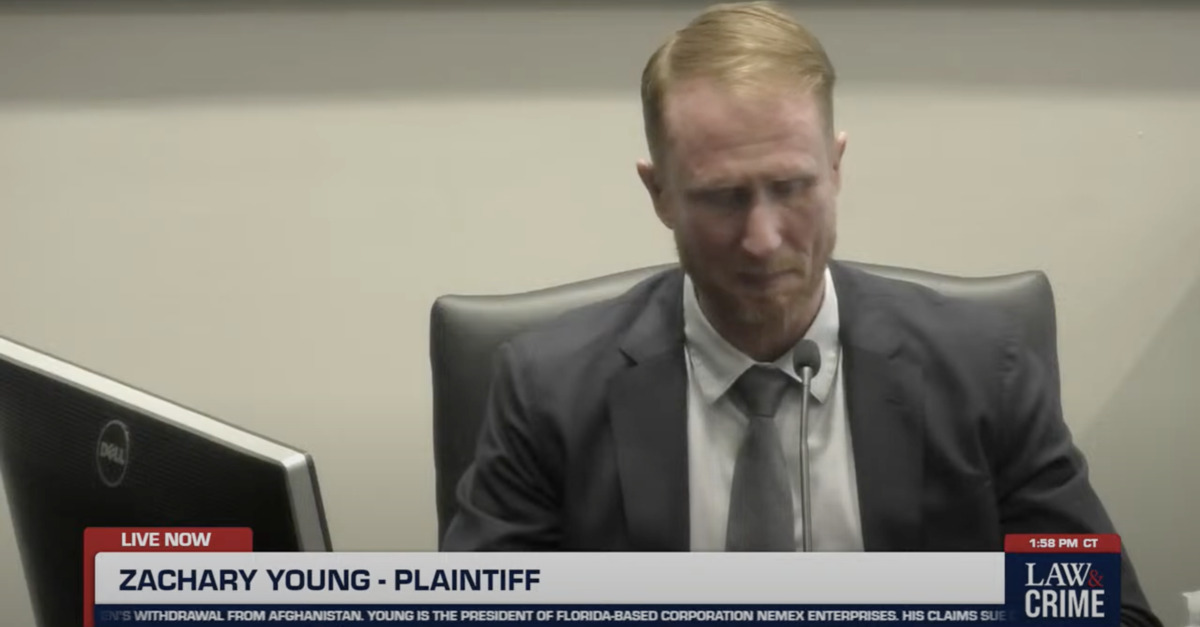
Zachary Young in court during his defamation trial against CNN on Jan. 8, 2025 (Law&Crime).
The U.S. Navy veteran suing CNN for defamation took the stand for the first time on Wednesday as both sides sought to sway a Florida jury with facts and emotion in the potentially costly case.
Plaintiff Zachary Young, a security contractor who extracted people from Afghanistan, claims a 2021 segment that aired on “The Lead with Jake Tapper” falsely painted him as an “illegal profiteer” exploiting “desperate Afghans” with “exorbitant” fees amid the fallout of President Joe Biden’s chaotic withdrawal from the country.
While a key issue in pretrial motions practice — and during opening statements — was CNN’s use of, as well as the network’s definition of, the term “black market,” on Wednesday, Bay County jurors saw the case almost entirely from the perspective of the man himself.
But the hotly-contested term did indeed figure prominently during the proceedings with Young on the stand.
As a projector’s image of a Google search page showed the phrase, Young read the definition from a dictionary.
“It says: ‘an illegal traffic or trade in officially controlled or scarce commodities,’ and they give the example: ‘they plan to sell meat on the black market,’” the plaintiff said.
The plaintiff’s attorney Kyle Roche then asked: “Is that consistent with your understanding?”
To which Young replied: “Yes. That’s what it means.”
More dictionary definitions followed, in stark, black-and-white, occasionally plodding terms. The plaintiff recited the definitions slowly as the attorney let them linger on screens for the jury to view. And then came the juxtaposition: clips of CNN’s coverage with the term “black markets” emblazoned on the chyron.
Later, in various ways, the attorneys aimed to tug at the heartstrings of the women and men determining the facts in the case.
Young maintains that CNN’s broadcast effectively tarred him as a scofflaw and ruined his business, making it nearly impossible for him to work because of the severe damage to his reputation that ensued.
“I became an outcast and that’s what I felt like,” Young told jurors. “And to a large degree I still do.”
When it was CNN’s turn to captain the questioning at the dais, however, an entirely different tack was tried.
After going through the decided dearth of evidence about Young’s communications with potential clients due to the deletion of his LinkedIn account after the CNN story ran, the network’s attorney began a lengthy series of questioning about the plaintiff’s past work, travel, and living arrangements. These questions would eventually run something not entirely unlike the gamut of inquiries — and would even lightly touch upon work the plaintiff said he could not discuss due to the classified nature of his jobs through the years.
But one specific series of questions stood out.
After establishing Young has been living in Austria for roughly 17 years, CNN’s attorney asked: “And when was the last time you were in Florida?”
A quick objection derailed proceedings for several minutes as the audio cut out on the trial feed. A sidebar resulted. The network appeared to win the argument. Fourteenth Judicial Circuit Court Judge William Henry told the attorney to ask his question again.
“When was the last time you were in Florida?”
Young replied: “The question — the last time before today?”
“Yeah, before today,” CNN’s attorney pressed.
The plaintiff’s prior travel to the Sunshine State was sometime in 2024 for an attempt at mediation — an answer which appeared to get closer to the heart of CNN’s point, but maybe not all the way.
“The next question would be, before this litigation, when was the last time you were in Florida?” the attorney asked.
This time, an objection was instantly overruled.
“That was, I’m not sure, a long time,” Young said. “More than 10 years. I don’t remember the date.”
The upshot of these questions, perhaps unclear to viewers writ large, appeared to be an effort by the cable news channel to tar Young as an opportunistic user of Florida’s legal system. Such arguments, while not explicit, may prove attractive to civil jurors who may ultimately be asked to assess whether a dollar amount is needed to rectify the situation before them.
Trial in the case continues on Thursday.
The post ‘I became an outcast’: Navy veteran and CNN duke it out with emotional arguments during direct testimony and combative cross-examination in high-stakes defamation case first appeared on Law & Crime.




![Tyson Foods Plant [Photo: Food Manufacturing]](https://southarkansassun.com/wp-content/uploads/2023/08/iStock_1185520857__1_.5e441daa51cca-600x337.jpg)






![Silverado Senior Living Management Inc. [Photo: Los Angeles Times]](https://southarkansassun.com/wp-content/uploads/2023/10/download-6-4-600x337.jpg)

![China's Wuhan Institute of Virology [Photo: Nature]](https://southarkansassun.com/wp-content/uploads/2023/09/d41586-021-01529-3_19239608-600x337.jpg)
















